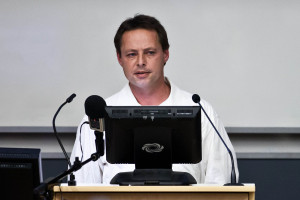Abbott Denies Apology to Recently Cleared Australian Guantanamo Bay Inmate
David Hicks, a 39 year-old Australian who was an inmate at Guantanamo Bay from 2001-2007, has just been declared innocent by the U.S. military court. Although Hicks’s charges have been dropped, Prime Minister Tony Abbott and former Prime Minister John Howard, who was in power throughout Hicks’ detention at Guantanamo, have maintained that regardless of his official criminal status, Hicks remains guilty of heinous acts, and thus the government refuses to issue an apology. Hicks himself has not requested one, but has stated that he wants monetary compensation from the government to cover his medical costs resulting from injuries incurred while he was kept in ‘torturous’ conditions at Guantanamo.

Hicks was caught by the Northern Alliance while at an al-Qaeda training camp in Afghanistan in 2001 and handed over to the United States. He was convicted of materially supporting terrorism in March 2007, after he was supposedly coerced into a plea bargain that allowed him to return home to Australia to see out the remaining months of his sentence. Hicks’ father Terry told the Guardian that the plea bargain must be considered in the context of the conditions at Guantanamo Bay. Hicks himself has spoken in detail about the treatment he received while at the infamous prison, recounting periods of solitary confinement, systematic drugging and frequent beating. It is this conduct that lies at the root of Hicks’s quest for government compensation for his medical care, and presumably the Opposition leader Bill Shorten’s concession that ‘clearly there has been an injustice done to him [Hicks]’ while he ‘was probably foolish to get caught up in that Afghanistan conflict.’
It is notable that any conception of injustice, whether by Shorten or the American courts, is concerned with the judicial process or the conditions of Hicks’s prison stay, and not his guilt in becoming involved in terrorist operations. This would be because Hicks himself has admitted to his involvement with al-Qaeda and even meetings with Osama Bin Laden himself. On these grounds, Australian Attorney-General George Brandis argues that under current law, Hicks’s conviction would be valid, but it is simply because his crimes took place before the introduction of the counter-terrorism laws in 2002 that his sentence was able to be overturned, and ‘not about whether he carried out the activities of which he was accused.’ Abbott also claimed, ‘I am not in the business of apologising for the actions that Australian governments take to protect our country,’ seamlessly bringing the security versus individual liberty debate to the crowded table.
It seems that the Australian government has clearly taken a position which prioritizes security above liberty. Sidestepping the question of whether or not Hicks was unfairly treated, falsely imprisoned, and unjustifiably tried, government officials emphasize that he was incarcerated because of the fact that he was, by admission, involved with terrorism in the Middle East. Therefore, the handling of the situation was done according to the best interests of Australia’s and America’s national security, and this consideration trumps even the lawfulness of the act. This attitude is particularly understandable in light of Australia’s recent history with terrorism, including the Sydney Siege and Brisbane and Sydney raids over a suspected ISIS plot. As a result, Australia is both justifiably more alert to security threats and its public is more likely to support a tougher stance against terrorism, thus making Abbott’s position pragmatically and politically valid, if somewhat lacking in compassion.
